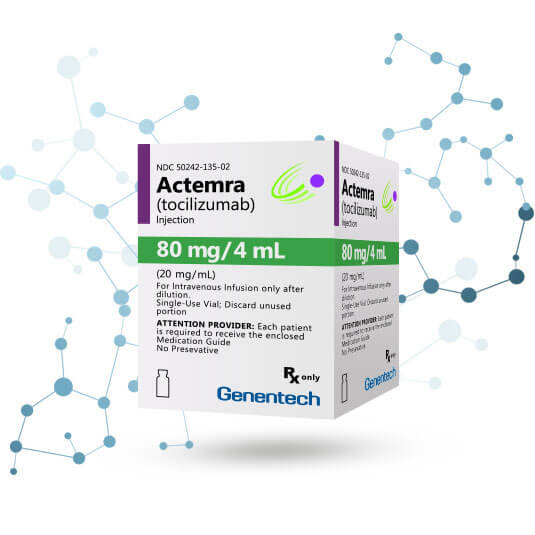Actemra Overview (Tocilizumab)
 Rheumatoid arthritis is a chronic, incurable disease that affects over 1.3 million Americans. Actemra (tocilizumab) is an injectable prescription drug that treats moderate to severe rheumatoid arthritis in adults as well as children. Today, doctors prescribe more than 760,000 patients globally. In 2016 alone, Actemra generated $1.7 billion in sales revenue, making it the fifth most profitable drug for manufacturer Roche. While doctors prescribe it for rheumatoid arthritis, there are many different “off-label” uses we’ll explore in out Actemra overview below. Off-label use can lead to serious complications — especially when pharmaceutical companies don’t properly warn patients about associated risks.
Rheumatoid arthritis is a chronic, incurable disease that affects over 1.3 million Americans. Actemra (tocilizumab) is an injectable prescription drug that treats moderate to severe rheumatoid arthritis in adults as well as children. Today, doctors prescribe more than 760,000 patients globally. In 2016 alone, Actemra generated $1.7 billion in sales revenue, making it the fifth most profitable drug for manufacturer Roche. While doctors prescribe it for rheumatoid arthritis, there are many different “off-label” uses we’ll explore in out Actemra overview below. Off-label use can lead to serious complications — especially when pharmaceutical companies don’t properly warn patients about associated risks.
The U.S. Food and Drug Administration expedited Actemra’s review process because it met a critical need for suffering RA patients. But since Actemra’s 2010 FDA approval, patients submitted adverse event reports to the agency, detailing over 1,000 unexpected deaths. As a result, Actemra lawsuits are now underway.
Actemra Overview: How IL-6 Inhibitor Drugs Work
Inflammation within your blood vessels that eventually damages vein walls is known as vasculitis. When systemic vascular inflammation occurs, arteries tighten and blood flow slows down. Actemra belongs to a newer, targeted biological drug class called interleukin 6 (IL-6) inhibitors. IL-6 inhibitors block your body from producing too much interleukin protein, which causes severe inflammation. Before Roche developed Actemra, most medications prescribed to treat rheumatoid arthritis were drugs called Tumor Necrosis Factor inhibitors, or TNFis. Patients who don’t respond well to TNFi drugs such as Humira, Enbrel and Remicade may have better results with Actemra. Actemra is given once weekly through a slow, subcutaneous injection or through a monthly intravenous infusion, depending on your condition. If you’re taking Actemra injections, each treatment takes approximately one hour to complete.
In May 2017, the FDA approved Actemra to treat the most common form of vasculitis called giant cell arteritis (GCA). GCA is an autoimmune disease that primarily affects arteries around your scalp, temples and neck. In addition to GCA, doctors prescribe Actemra to adults with moderate to severe rheumatoid arthritis to ease inflammation-induced joint pain. In most cases, Actemra won’t be your first treatment option. Instead, doctors typically prescribe Actemra after at least one other Disease Modifying Anti-Rheumatic Drug (DMARD) failed to relieve your symptoms. More recently, the FDA approved Actemra to treat active Polyarticular Juvenile Idiopathic Arthritis (PJIA) in children aged two and older.
Actemra Overview: Studies Reveal Potentially Fatal Side Effects Not Listed On Drug’s Label
Actemra’s initial marketing campaign called the new drug a “unique” breakthrough. And unlike competitors Humira and Remicade, Actemra’s label didn’t list heart attack, heart failure, or lung complication side effect risks. In fact, the only major Actemra side effects listed on the drug’s packaging include:
- Upper respiratory tract infections (common cold, sinus infections)
- Headache
- Increased blood pressure
- Injection site reactions
But according to post-marketing study evidence, Actemra’s life-threatening health complication risks are as high or higher than any TNFi drug. The FDA’s adverse event report database shows that since 2010, 1,128 patients died shortly after taking Actemra. A 2012 Actemra report found 258 pancreatitis and 185 interstitial lung disease adverse event reports from patients. Multiple clinical trials and medical studies show Actemra’s complication rates are comparable to competitors such as Enbrel, Humira, and Remicade. But while TNFi drug manufacturers warn patients about increased stroke, heart attack, lung disease and pancreatitis risks, Actemra’s does not. As a result, thousands of patients suffered life-threatening health problems, including some that led to the patient’s death.
Actemra Overview: Wrongful Death & Product Liability Lawsuit History
Actemra patients suffering from pancreatitis, interstitial lung disease, heart failure and other associated side effects are now suing the manufacturer. In addition, victims’ families are also filing wrongful death claims against Roche’s subsidiary company, Genentech, which distributes Actemra in America. Despite strong evidence Actemra may harm patients, the drug’s manufacturer refuses to add warning labels about life-threatening side effect risks. To date, the FDA hasn’t stepped in to enforce additional warning labels or issued further drug safety communications regarding Actemra.
If you or a loved one experienced severe health complications while taking Actemra, you may qualify for a cash settlement. Competing drugs’ labels warn patients about heart, lung, stomach and pancreatic damage risks, while Actemra does not. For this reason, multiple Actemra arthritis patients are suing Genentech and Roche for failure to warn claims across the country.
Check eligibility for compensation.
If you or a loved one experienced GI perforation, pancreatitis, interstitial lung disease or heart damage while taking Actemra, you may be entitled to compensation from the manufacturer. Request your free case evaluation now to see if you may qualify.
Lori Polemenakos is Director of Consumer Content and SEO strategist for LeadingResponse, a legal marketing company. An award-winning journalist, writer and editor based in Dallas, Texas, she's produced articles for major brands such as Match.com, Yahoo!, MSN, AOL, Xfinity, Mail.com, and edited several published books. Since 2016, she's published hundreds of articles about Social Security disability, workers' compensation, veterans' benefits, personal injury, mass tort, auto accident claims, bankruptcy, employment law and other related legal issues.



